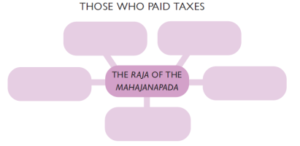NCERT Solutions Class 6 Social Science (History)
The NCERT Solutions in English Language for Class 6 Social Science (History) Chapter – 5 (Kingdoms, Kings and An Early Republic) has been provided here to help the students in solving the questions from this exercise.
Chapter – 5 (Kingdoms, Kings and An Early Republic)
Let’s Recall
1. State whether true or false:
(a) Rajas who led the ashvamedha horse pass through their lands were invited to the sacrifice.
(b) The charioteer sprinkled sacred water on the king
(c) Archaeologists have found palaces in the settlements of the janapadas
(d) Pots to store grain were made out of Painted Grey Ware
(e) Many cities in mahajanapadas were fortified
Answer –
(a) Rajas who led the ashvamedha horse pass through their lands were invited to the sacrifice. (True)
(b) The charioteer sprinkled sacred water on the king. (False)
(c) Archaeologists have found palaces in the settlements of the janapadas. (False)
(d) Pots to store grain were made out of Painted Grey Ware. (False)
(e) Many cities in mahajanapadas were fortified. (True)
2. Fill in the chart given below with the terms: hunter-gatherers, farmers, traders, craftspersons, herders.
 Answer –
Answer –
Farmers – Gave one-sixth of the produce to the state
Craftspersons – contributed to labour
Herder – contributed in the form of animal produce
Traders – stimulated commercial activity by buying and selling goods
Hunter-gatherers – would provide forest produce such as elephants, furs and other items as a tribute.
3. Who were the groups who could not participate in the assemblies of the ganas?
Answer – The following groups couldn’t participate in the assemblies of the ganas:
1. Women
2. Dasas, the slaves
3. Kammakaras, the landless labourers
4. Why did the rajas of mahajanapadas build forts?
Answer – People need protection from the attack of the other kings. So the Raja of Mahajanapadas built forts.
5. In what ways are present-day elections different from the ways in which rulers were chosen in janapadas?
Answer – The small states were ruled by tribal rulers are called Janapadas. Each Jana has its own leader. He was known by the name of Raja. The position of Raja was hereditary He can be removed only when the situation demands. But in present day, we elect our leader or M.P. or M.L.A. by electoral process. Their position is not hereditary and can belong to any caste. Their are also so many national level party in present day So different person of different part can be elected.
NCERT Class 6 – History (Our Pasts – I)
- Chapter 1 – What, Where, How and When?
- Chapter 2 – From Hunting – Gathering to Growing Food
- Chapter 3 – In the Earliest Cities
- Chapter 4 – What Books and Burials Tell Us
- Chapter 6 – New Questions and Ideas
- Chapter 7 – Ashoka, The Emperor Who Gave Up War
- Chapter 8 – Vital Villages, Thriving Towns
- Chapter 9 – Traders, Kings and Pilgrims
- Chapter 10 – New Empires and Kingdoms
- Chapter 11 – Buildings, Paintings, and Books

Leave a Reply